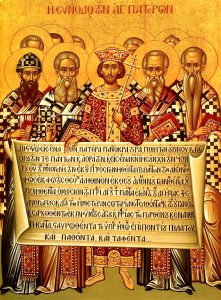 On this Sunday, we commemorate the First Ecumenical Council held in the year 325. This Council defined our faith in Christ, that he was truly God, who had been born of the Virgin Mary as a human being, therefore uniting God and us. The proclamation of faith that they composed is now read at every Divine Liturgy. It was completed in its present form at the Council of Constantinople in 381, with a fuller definition of the nature of the Holy Spirit. When the Creed is about to be read, the deacon intones, “Let us love one another, that with one mind we may profess: (we then recite the Creed).” In our faith, we profess the love of God for us, because he has come to be with us, and has sent the Spirit of truth in our hearts, to “ … guide you to all truth. (John 16:13)” The truth is this: that Jesus the Messiah is truly the Son of God, that he is our Redeemer, and that he has ascended into glory, but has not left us orphans, sending his Spirit into our hearts and minds and souls. Jesus told us, “I am the way and the truth and the life. (John 14:6)” If this is indeed the truth, then, as the deacon in the Liturgy says, we must profess it “in one mind.” We conclude the prayer of the Anaphora by saying, “Grant that with one voice and one heart we may glorify and praise your most honored and magnificent name, Father, Son and Holy Spirit.”
On this Sunday, we commemorate the First Ecumenical Council held in the year 325. This Council defined our faith in Christ, that he was truly God, who had been born of the Virgin Mary as a human being, therefore uniting God and us. The proclamation of faith that they composed is now read at every Divine Liturgy. It was completed in its present form at the Council of Constantinople in 381, with a fuller definition of the nature of the Holy Spirit. When the Creed is about to be read, the deacon intones, “Let us love one another, that with one mind we may profess: (we then recite the Creed).” In our faith, we profess the love of God for us, because he has come to be with us, and has sent the Spirit of truth in our hearts, to “ … guide you to all truth. (John 16:13)” The truth is this: that Jesus the Messiah is truly the Son of God, that he is our Redeemer, and that he has ascended into glory, but has not left us orphans, sending his Spirit into our hearts and minds and souls. Jesus told us, “I am the way and the truth and the life. (John 14:6)” If this is indeed the truth, then, as the deacon in the Liturgy says, we must profess it “in one mind.” We conclude the prayer of the Anaphora by saying, “Grant that with one voice and one heart we may glorify and praise your most honored and magnificent name, Father, Son and Holy Spirit.”
Today’s Gospel tells us that this is exactly how we are united to God, and become “partakers of the divine nature (2 Peter 1:4): “Holy Father, keep them in your name that you have given me, so that they may be one just as we are. (John 17:11)” There is no unity more perfect than the unity of the Trinity, and in our life of faith, we share in that unity. Throughout the history of the Church, there have been those who have erred either by saying that Jesus is not perfect man or by saying that he is not perfect God. We too often let our own self-righteousness dominate the transcendent truth of the faith. However, the deacon says one thing even more profound – this unity must proceed from love, for he says, “Let us love one another that we may profess … “ The world today seems to thrive on a rhetoric of hate rather than love, and the false ideas of the world can easily infect the Church. The feast today is directly opposed to hatred, it tells us that we can achieve the unity that God desires only through love, for “God is love. (1 John 4:8)”